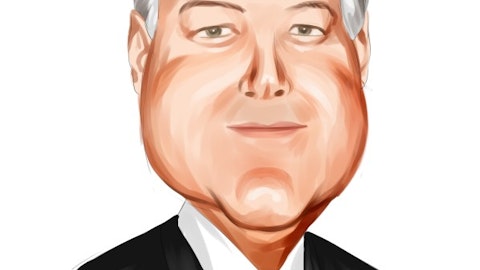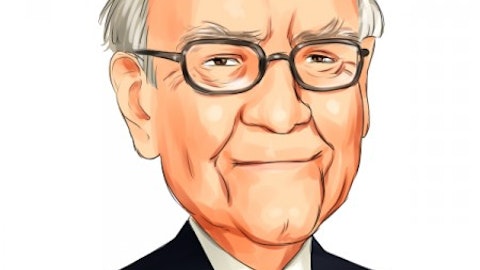Statistics reveal that last week’s volume of insider selling more than doubled compared to the volume registered in the prior week, whereas the volume of insider buying declined quite meaningfully week-over-week. As a result, the ratio of insider selling over insider buying increased dramatically week-over-week. What can one make of this change in insider sentiment? Taking into account that all major stock indexes ended January at least 5% in the red, the recent surge in the insider selling-to-insider buying ratio might suggest that corporate insiders are no longer acting as contrarian investors and are beginning to join the camp of investors running away from equities. It is still too early to say that the broader market selloff will continue its course in the upcoming weeks, but one should not ignore this possible course of events. Meanwhile, there were several companies that witnessed noteworthy insider sales last week, and this article will primarily focus on three companies that registered the largest insider sales during the previous week.
Prior to discussing the insider trading activity, let’s make you familiar with what Insider Monkey does. At Insider Monkey, we track hedge funds’ moves in order to identify actionable patterns and profit from them. But why do we track hedge fund activity? From one point of view we can argue that hedge funds are consistently underperforming when it comes to net returns over the last three years, when compared to the S&P 500. But that doesn’t mean that we should completely neglect their activity. There are various reasons behind the low hedge fund returns. Our research indicated that hedge funds’ long positions actually beat the market. In our back-tests covering the 1999-2012 period, hedge funds’ top small-cap stocks beat the S&P 500 index by double digits annually (read the details here).
Costco Wholesale Corporation (NASDAQ:COST) saw one of its insiders sell big this past week. Director James D. Sinegal, co-founder of Costco, offloaded 44,125 shares last Monday at prices that ranged from $151.66 to $152.24 per share, cutting his direct ownership stake to 804,419 shares. The Director also holds an additional 804,018 shares, which are held indirectly through LLC. The shares of the operator of membership warehouses are up by 3% over the past 12-month period despite having lost 6% thus far in 2016. The company’s net sales for the first quarter of fiscal year 2016 that ended November 22 totaled $26.63 billion, which marked an increase of 1% year-over-year. The increase was achieved as a result of new warehouse openings, which was in turn offset by a drop in comparable-warehouse sales. Costco Wholesale Corporation (NASDAQ:COST)’s gross margin for the first quarter of the fiscal 2016 year increased to 11.29% from 11.03% year-over-year.
However, the discussion of the company’s financial performance does not necessarily indicate whether the Director’s decision to sell shares is well-thought-out and well-timed, or simply conceals another purpose, so let’s consider other indicators. It is important to note that Costco’s stock trades at a rather expensive forward price-to-earnings multiple of 24.30, which is higher than the forward P/E multiples of the company’s major competitors within the wholesale food retailers industry. For instance, Wal-Mart Stores Inc. (NYSE:WMT) has a forward P/E of 15.91, The Kroger Co (NYSE:KR) has a P/E of 17.33, and SYSCO Corporation (NYSE:SYY) trades at a ratio of 18.81. A total of 38 hedge funds from our system were invested in Costco at the end of the third quarter, accumulating a mere 2.80% of the company’s outstanding common stock. Warren Buffett of Berkshire Hathaway owns 4.33 million shares of Costco Wholesale Corporation (NASDAQ:COST) as of September 30.
Follow Costco Wholesale Corp W (NASDAQ:COST)
Follow Costco Wholesale Corp W (NASDAQ:COST)
Receive real-time insider trading and news alerts
The following two pages of this insider trading article reveal the insider sales registered at Terex Corporation (NYSE:TEX) and Maxim Integrated Products Inc. (NASDAQ:MXIM).
Terex Corporation (NYSE:TEX) also witnessed heavy insider selling last week. Timothy A. Ford, Former President of Terex Cranes at Terex, sold a 4,022-share stake on Tuesday and 60,208 shares on Wednesday, at prices varying from $22.01 to $22.34 per share. The 4,022-share stake was held as part of the seller’s 401(k) plan, while the other block of shares was held directly by Ford. After the recent transactions, he continues to hold a direct ownership stake of 60,480 shares. Terex Corporation announced in August 2015 that the former executive was leaving the company to pursue other opportunities.
The lifting and material handling solutions company entered into a Business Combination Agreement with Finnish Konecranes PLC in August 2015, a merger that will create a cranemaking giant with a market cap of roughly $5.7 billion. Pursuant to the agreement, each shareholder of Terex is set to receive 0.8 Konecranes shares per each Terex share owned. Nonetheless, there is the possibility that the deal will not go through, as Terex announced last week that Chinese cranes and equipment company Zoomlion had proposed to purchase Terex for $30.00 per share in cash. However, some doubt that the Zoomlion-Terex deal will succeed, considering Zoomlion’s weak balance sheet. The shares of Terex have jumped by 45% over the past five-day period, which likely explains why the former executive was cashing out last week. To sum up, it remains to be seen what decision Terex’s Board of Directors will make, as it is currently reviewing the newly-received proposal. David Tepper’s Appaloosa Management LP holds a 1.65 million-share position in Terex Corporation (NYSE:TEX) as of the end of the third quarter.
Follow Terex Corp (NYSE:TEX)
Follow Terex Corp (NYSE:TEX)
Receive real-time insider trading and news alerts
To wrap up our discussion, let’s examine the recent insider selling activity witnessed at Maxim Integrated Products Inc. (NASDAQ:MXIM). Director James R. Bergman reported selling 27,250 shares on Tuesday at prices ranging from $31.76 to $33.91 per share. Following the recent selloff, the Director holds an ownership stake of 96,600 shares, which also includes unvested restricted stock units. The Director also owns an indirect ownership stake of 25,000 shares through a Family Foundation.
The maker of analog chips had discussions with both Texas Instruments Incorporated (NASDAQ:TXN) and Analog Devices Inc. (NASDAQ:ADI) last year about a possible sale, but the two potential acquirers recently decided to abandon the talks. Even so, analysts believe that Maxim Integrated could attract some interest from Chinese companies despite its high market capitalization. Maxim Integrated reported net revenue of $1.07 billion for the six months that ended December 26, which compares with the $1.15 billion figure that it reported for the same period the prior year. The company’s revenue from its communications and data center declined by 21% year-over-year due to softening demand for server, basestation and data storage products. The revenue generated from consumer products declined by 10% year-over-year due to lower demand for smartphones, while the company’s automotive net revenue climbed by 37% year-over-year. The stock trades at a rather expensive forward P/E multiple of 17.28, which compares with the average of 15.89 for the companies included in the S&P 500 benchmark. Let’s not forget to mention that the stock is down by 12% year-to-date, but still remains in positive territory for the past 12-month period. Israel Englander’s Millennium Management reported ownership of 2.41 million shares of Maxim Integrated Products Inc. (NASDAQ:MXIM) through its 13F for the third quarter.
Follow Maxim Integrated Products Inc (NASDAQ:MXIM)
Follow Maxim Integrated Products Inc (NASDAQ:MXIM)
Receive real-time insider trading and news alerts
Disclosure: None





